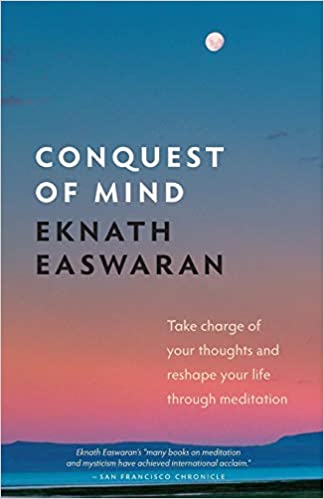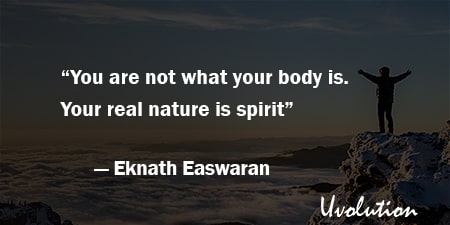Conquest of Mind by Eknath Easwaran
The Book in 1 Sentences
Conquest of Mind: Take Charge of Your Thoughts and Reshape Your Life Through Meditation
“But we can change. No one need ever feel resigned and say, “There is nothing I can do.” There is everything we can do. That is the purpose and the power of that persistent upward force within us: if we turn inward we can remake ourselves completely, modeling ourselves in the image of the loftiest spiritual ideal we can conceive.” ~ Eknath Easwaran
12 BIG Ideas
Conquest of Mind Book Summary
1. Meditation is warm-up exercise for the mind
“Whenever I describe the mechanics of meditation in this book, I will always be referring to the method I teach, which I have practiced myself for many decades. It is essentially the training of attention.
The technique is simple but far from easy. It requires effort, and - like athletic conditioning - it can be quite strenuous. Its purpose is not to attain some remarkable experience during meditation but to master the thinking process.
The rewards, therefore, come during the rest of the day. As your meditation deepens, you will find yourself stronger and more resilient, better able to face the challenges of life as the kind of person you would like to be: loving, creative, resourceful, and full of vitality.”
“Meditation is warm-up exercise for the mind, so that you can jog through the rest of the day without getting agitated or spraining your patience.”
“‘I can tell my hand what to do,” Augustine once observed, “and it obeys. Why can’t I do the same with my mind?’.”
““All that we are,” the Buddha said, “is the result of what we have thought.” He might have added, “And all we shall become is the result of what we think now.””
2. Stick-to-itiveness (Self- discipline)
“In every fitness program, of course, it is stick-to-itiveness that counts. You get nowhere if you exercise by fits and starts. Don’t go out one day and do a lot of exercises, then get depressed the next day, go to bed, and skip the program completely. Keep on exercising, whether it feels good or not. That is how you develop a fit will and a svelte, attractive personality.”
Michael Beckwith - in his great book Spiritual Liberation - also says: “The gift of self- discipline is that it has the power to take you beyond the reasoning of temporary emotion to freedom.
Think of how empowered you’ve felt on occasions when you haven’t given in to the ‘I don’t feel like it’ syndrome and honored your commitment to yourself.
What does not feeling like it have to do with it? The combination of love for something with the willingness to do what it takes to practice it—discipline—results in freedom.”
“If you want to see someone who will succeed, watch for the rare man or woman who takes pains over each small step.”
3. It takes effort and energy
“This may sound odd, because intense activity is generally motivated toward goals that are just the opposite of spiritual. But over the years I have made a rather surprising observation:
the person who is relaxed, easygoing, “laid back,” may not be a good candidate for meditation. Such people simply may not be willing to put forth the effort required to make difficult changes in personality, or have the energy and the stamina to keep going when the going gets rough.
To go far in meditation, we need to rouse all the energy we can muster and then channel it all toward one overriding goal.”
“In small matters like these, gradually the mind can be effectively trained. At home, in meditation, at work, in moments of relaxation with family and friends, we can go against the conditioned caprices of the mind and gain, little by little, control of something which often seems nebulous and elusive: our own destiny.”
4. All life is yoga
“Sri Aurobindo, one of twentieth-century India’s most luminous figures, has a good motto for reminding us of this: “All life is yoga.” Every moment, he means, is an opportunity for training the mind.”
Genpo Roshi’s - in Big Mind Big Heart - tells us: “We’re at the point in our evolution that we all have to become conscious. This is a time of revolution. There’s no holding back. So I’m about tearing down the monastery walls and seeing the whole world as the monastery, as the practice, as the spiritual temple. What we’re all working on is this very being, this very life. This is the temple, it has no walls.”
5. Panorama of that person’s good qualities!
“To give one small illustration, whenever somebody is unkind to me, I can immediately unroll the panorama of that person’s good qualities. Instantly the balance is set right. As with most skills, this is a matter of practice.
When you are having trouble getting along with someone, a simple first step is to sit down quietly and recall how many times that person has given you support. You are using positive memories to drive out negative ones before they have a chance to crowd together and form a mob, which is all resentment really is.”
““The first strategy is literally “changing one thought for another”: a negative thought for a positive one, an unkind thought for a kind one. “Just as a carpenter uses a small peg to drive out a bigger one,” the Buddha says, “you can use a right thought to drive out one that is wrong.””
6. Re-focus on the positive
“This is a miraculous achievement, but there is no miracle about how it is accomplished. It requires a lot of hard work. When your meditation is progressing well, if your mind goes into a negative mood - about yourself, about your problems, about other people, about the state of the world - you should be able to switch your attention away from the negative and focus it on the positive.
By doing this over and over again, you can reach a state in which negative thoughts cannot even appear on the scene. Then your behavior is always kind, your words are always helpful, and your life becomes a positive influence on all.”
“Hard work is absolutely necessary for excellence in any field, and nothing requires more intense effort than meditation.”
7. Spiritual growth takes time
“Whatever romantic notions we may have about spiritual growth, it never really happens in a short time. Like the Thirty Years’ War, this war within goes on and on. There is so much to transform! Naturally there come times when the mind gets tired and complains. “Why not call it off for a while?” This cannot be done.
Once we come face to face with a samskara in deeper consciousness, we are in the ring with it until we win. As my grandmother used to tell me, “The Lord will never put on your shoulders even one pound more than you can bear. But, “she would always add, “you will never have to carry one pound less, either.” Otherwise we would not grow.”
8. The capacity to change ourselves
“Of all that is wonderful in the human being, our most glorious asset is this capacity to change ourselves. Nothing is more significant.
I admire the achievements of science, but I do not feel intimidated by the current conviction that we are what our genes are. My body is what my genes make it, but my character and behavior are not fixed by my genetic code.
As proof we have the lives of great men and women of all religions who have thrown these claims to the winds with their personal transformations - from angry to compassionate, from insecure to unshakable, from human to divine.
The message of their lives echoes down the corridors of time to those who have ears to hear: “You are not what your body is. Your real nature is spirit, which nothing can diminish or deny.” Whatever our past, whatever our present, all of us have the capacity to change ourselves completely through the practice of meditation.”
“Just as there are certain exercises for toning a particular set of muscles, there are special exercises for developing a fit personality. Every provocation is an exercise for developing patience; every opportunity to retaliate offers a chance to harness your passions. The question is the same as in a physical fitness program: how much do you want to get in shape?”
9. Regular practice of meditation
“Nothing you can do will strengthen your determination more than the regular practice of meditation: at the same time, and for the full length of time, every single day.”
“Today, everything I do from morning meditation on--eating breakfast, going for a walk, writing, reading, even recreation--is governed by one purpose only: how to give the very best account of my life that I can in the service of all.”
“Ultimately there is not the slightest doubt that everyone who practices these disciplines with sustained enthusiasm can and will win this battle. The main question is how long we are going to let ourselves get knocked about first.””
10. “Heroes at the beginning”
“In Sanskrit we have a word which means “heroes at the beginning”: people who take up a job with a fanfare of trumpets but soon find that their enthusiasm has tiptoed down the back stair.
Those who go far in meditation are the ones who keep on plugging. They may not be very spectacular; they may never hear a trumpet. But they keep on trying day in and day out, giving their best in every situation and relationship, never giving up. Such people are bound to reach their goal.”
Russell Simmons - in his book Do You! - also says: “Focus on your vision and keep going until you hit the finish line. Don’t be one of the people who believe in their vision at first but then give up. See it through, no matter how long it takes. Understand that obstacles are just part of the game. Whatever you imagine, you can achieve. Once you realize this truth, no one is going to be able to stop you.”
George Leonard - in Mastery - says: “We fail to realize that mastery is not about perfection. It’s about a process, a journey. The master is the one who stays on the path day after day, year after year. The master is the one who is willing to try, and fail, and try again, for as long as he or she lives.”
11. Love the whole world
“When you realize the divine Self within you, the Bhagavad Gita says, you are launched beyond superficial living like a missile. Your joy and your capacity to contribute to life are multiplied a million times.
To inspire us, the Buddha has given us in one sentence a model of ourselves as glorious and yet as human as any we could ever desire. “Love the whole world,” he says, “as a mother loves her only child.” Love like this will plunge us into deepest consciousness and release in us the power to make a lasting contribution to all of life.”
“A beautiful prayer from the ancient Hindu scriptures echoes in my heart always: “May all creatures be happy. May people everywhere live in abiding peace and love.” For all of us are one, and joy can be found only in the joy of all.”
12. Spiritual living is responsible living
“To fail to live up to this challenge, my spiritual teacher used to say, is simply being irresponsible. This is not asking for perfection but merely expecting us to do our best to grow.
If we do not do this much, we are depriving life of a contribution that only we can make. Spiritual living is responsible living. I am responsible not only for myself but for all of you, just as all of you are responsible for each other and for me.”
That was my QUICK summary of the great book Conquest of Mind by Eknath Easwaran. If you’re interested, get your copy. There is a HUGE amount of life-changing ideas in this book, and we’ve only touched on a tiny bit of it.
Buy The Book: Conquest of Mind by Eknath Easwaran

GET Blinkist 7 Days FREE Trial
3000+ Book Summaries
(Audio and Text)








